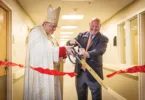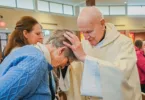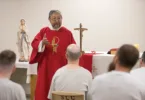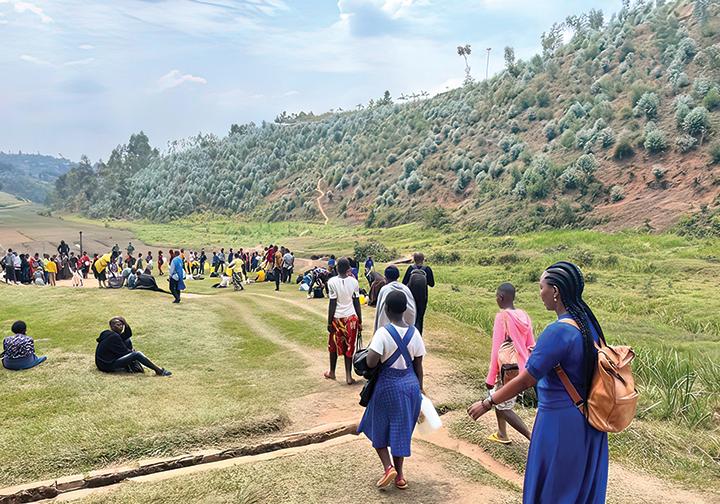
by Lindsey Weishar and Aline Mukobwa
Special to The Leaven
KANSAS CITY, Kan. — When Immaculée Ilibagiza spoke on Donnelly College’s campus here in November 2021, little did she know she’d meet a student familiar with her home country of Rwanda.
Aline Mukobwa, along with the rest of her Donnelly College peers, had read Ilibagiza’s “Left to Tell,” a moving and miraculous account of surviving the Rwandan genocide of the mid-1990s.
Each school year, Donnelly faculty, staff and students participate in the Common Read, a book read across the college. The Common Read is attached to a series of events throughout the school year such as film viewings, student panels and off-campus speakers, including a talk from the Common Read author.
Listening to Ilibagiza speak was a moving experience for Mukobwa.
“Meeting Immaculée Ilibagiza was an unexpected, yet amazing, experience and one of the greatest blessings I could have ever imagined,” she said. “The humility she exhibited taught me the importance of always being humble.”
Nine months later, Mukobwa had the opportunity of a lifetime: to accompany Ilibagiza and other travelers on a pilgrimage to Kibeho, a Marian apparition site in Rwanda. (To learn more about this first Vatican-approved Marian apparition site in Africa, see Ilibagiza’s “Our Lady of Kibeho: Mary Speaks to the World from the Heart of Africa.”)
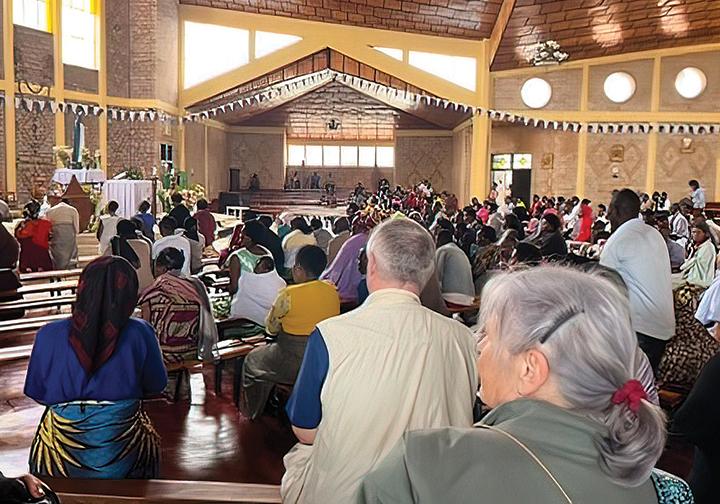
On this pilgrimage, Mukobwa, who comes from a Protestant background, experienced Mass for the first time.
“Going to Mass every morning changed the way I view prayer,” she reflected. “Having the chance to talk to the Lord a few times a day grew my relationship with God.”
Every morning opened with a Mass in Ilibagiza’s home chapel, which set the tone of prayerfulness that permeated each day of the pilgrimage. As Mukobwa put it, “Having Mass as our first activity of the day taught me to always put God first.”
Pilgrims also had the opportunity to walk the Way of the Rosary of the Seven Sorrows of the Virgin Mary and to attend Mass in the Church of Our Lady of Sorrows. Mukobwa was present at Kibeho for the solemnity of the Assumption of the Blessed Virgin Mary and remembers the sheer number of pilgrims who gathered to reverence Our Lady.
She wrote: “In the days leading up to the feast of the Assumption, people came from all over the world. These people spent three days outside. In the course of the feast, they walked barefoot. In addition, we walked to the holy water during this time (a place located on the Kibeho pilgrimage site from which pilgrims can get water). This long journey was undertaken by children, young adults and even elderly individuals in order to obtain a taste of the water. In speaking with the people around me, I found that everyone expressed a sense of relief and comfort after drinking the water. This is exactly what I experienced as well. This whole experience brought an endless joy to my heart. Having the belief to take on this journey — especially because some pilgrims were sick and the path was steep and rocky — can make anyone’s faith stronger.”

Ilibagiza also took pilgrims to the small bathroom in her hometown of Kibuye in which she, along with seven other women, hid for 91 days during the genocide of 1994, as well as to the Kigali Genocide Memorial.
“Walking into the Kigali Genocide Memorial had to be one of the most difficult moments in my entire life,” Mukobwa recalled. “Reading the stories of those who were killed — and how they were killed — was incredibly horrific.”
Both Ilibagiza’s personal memorial of the genocide and the national memorial represent a dedication to always remembering the past and honoring both those killed and those who live on.
The pilgrimage was powerful for Mukobwa not only because of the prayerfulness of the experience or the importance of the religious and historical sites the pilgrims visited, but because Rwanda is a part of Mukobwa’s own story.
Born in the Democratic Republic of the Congo in 2001, Mukobwa moved with her family to a refugee camp in Rwanda at the age of 5 due to war in her birthplace. Once in Rwanda, her family soon had to move to a camp in Uganda — this time due to a lack of jobs.
While in this camp, both of her parents became sick and had to go to separate countries for treatment, while Mukobwa stayed behind to care for two younger siblings.
“Basically, I was an adult at eight years old,” she said.
Unfortunately, Mukobwa and her siblings were not treated with kindness in the camp. In “Left to Tell,” Ilibagiza details the history of colonial powers that divided two groups of people in Rwanda – the Tutsis (who colonial powers saw as racially superior) and the Hutus. The camp in Uganda was largely made up of Hutu refugees, and Mukobwa’s family is Tutsi.
Mukobwa recalled that “most individuals in the refugee camp wanted my family and me to go back to Rwanda. They despised our appearance, which triggered them because many in the camp were Hutu. As a child, I remember my neighbors and classmates asking me, ‘How does it feel to come from a rich and beautiful culture?’ At this time, I did not know what they were talking about since my parents had always taught me to love people no matter how different we might appear. Our neighbors in the camp would often threaten us. I remember one of my neighbors showing me his dad’s machete and saying that his dad would use it to kill my family. They did not like the way we spoke, the way we carried ourselves and especially the way we looked. They would constantly tell us, ‘You look Tutsi, you have nothing to do here in the camp. Go back to Rwanda.’ We felt completely alone and unsafe.”
In this way, Mukobwa’s story parallels Ilibagiza’s — national unrest broke up both of their families and deeply changed their lives. Fortunately for Mukobwa, her family was reunited and able to immigrate to the United States together in 2014. Mukobwa was 13 years old.
During the pilgrimage, Mukobwa was able to share some of her story with Ilibagiza and discovered that “we relate to each other so much.” Their connection, forged on Donnelly’s campus and then in Rwanda, is a precious bond that Mukobwa hopes will last her entire life.
Mukobwa has now entered her second year at Donnelly and is studying sociology. She hopes to help immigrants become American citizens.
“I know what it’s like being in a country where you don’t feel safe and protected,” she said. “This is a part of many immigrants’ experience. I want to help them find somewhere to call home.”
Mukobwa finds that part of feeling at home involves having a close relationship with God. Through the journey back to Rwanda, this relationship with God has only grown stronger.
“Being a part of this pilgrimage has inspired me to stay strong no matter the hardships,” she said. “This pilgrimage taught me to always follow the way of God and not of this world. I am now more strong in my faith, and the way I view the world has changed forever. I’ve learned you cannot find happiness through worldly things.
“When you follow the things of this world, they often lead to disappointment. The only way to find peace and happiness is if you seek the kingdom of God.”



